1. DeLaval teat spray robot
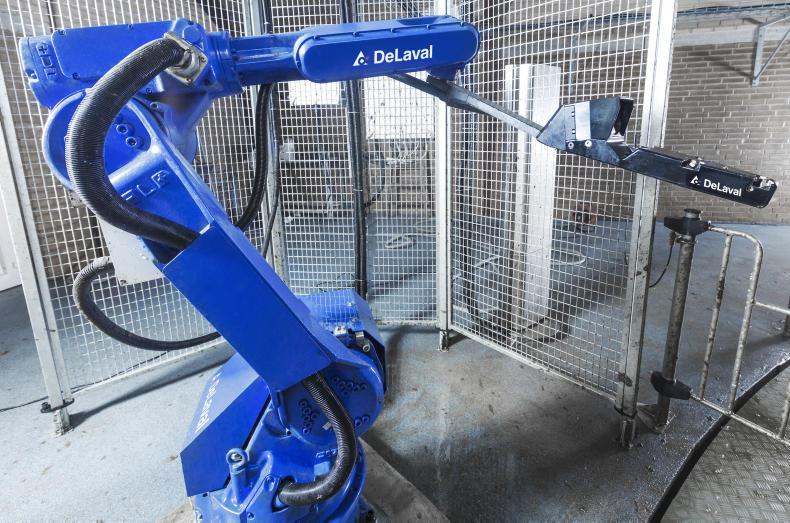
DeLaval teat-spraying robot (TSR).
The DeLaval teat spray robot (TSR) has recently been installed on the Hanrahan farm in Co Limerick – this is the first installation in Ireland or the UK. The system can be installed with both new and existing rotaries. The main benefits of the system are from a labour point of view. The TSR is seen as a more consistent and accurate way of applying teat spray to cows. The machine is capable of spraying up to 400 cows per hour.
Cameras located on a robotic arm locate and spray each teat. John Hanrahan is happy with how the machine has worked so far.
“We are very happy with how it is working so far. We are using about 10-12ml per cow, which is much less than we would have been traditionally using.
“It is installed on a 50-unit rotary and the hope is that the teat spraying machine can take a person out of the system for the summer and have one man operating the rotary,” according to John.
“It is using less stuff and it never misses a cow. Milking could take about four hours a day here so it has the possibility of saving four hours of labour a day for 300 days which could be a good saving.
The costs of the equipment are substantial and may only be suitable for those with a large herd but with the increased difficulty in sourcing labour it may be an option for some farmers.
2. Instant hot water with
Dairy Geyser
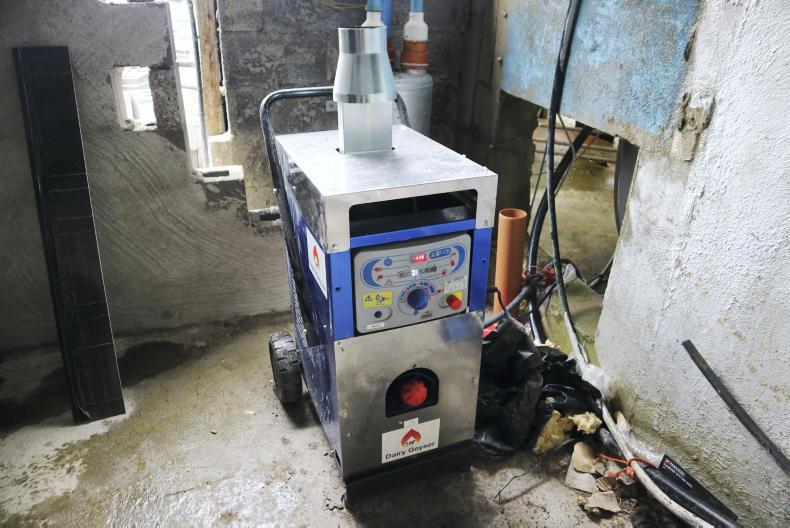
Dairy Geyser.
The Dairy Geyser diesel heater, which was developed by Martin Deady, provides instant hot water without the need for water storage. The heater is capable of producing approximately 20 litres of hot water per minute which will predominantly be used to clean dairy equipment, but another key use could be in the cleaning of sheds and in particular calf houses where a build-up of bacteria can lead to major health issues.
The machine can heat water up to a possible 150°C but one of the key uses would be to heat water to wash dairy equipment which would be around 70-80°C. The machine is very simple, with the cold water pipe inlet to the machine and the hot water pipe outlet which can be attached to the milking equipment or a power washer for cleaning, for example. The mobile nature of the heater means that it can be used in different sheds throughout the farm.
With the move by many dairy processors towards chlorine-free detergents to ensure low chlorate levels in milk, having sufficient levels of hot water to hand is key to ensuring an adequate clean, according to Syl Lyster from Dairy Geyser: “There are going to be big issues with using chlorine-free detergents. One of the key things that will be needed to make it work is hot water and enough of it. I believe that using sufficient hot water means that overall detergent use may be cut down.
“The machine will automatically start as the water begins to flow with hot water within 5 to 6 seconds. The machine is diesel-fuelled and it takes about one litre of fuel to heat approximately 100 litres of water to 75°C.”
On the farm that the Dairy Geyser was set up, the heater was being used to wash out a newly installed 18,000 litre bulk tank along with 24-unit parlour on a daily basis with no issues.
“Generally you would use 1% of the tank capacity to clean the tank,” according to Syl. “This system means that you are not waiting for water to heat up, or not having enough hot water to hand to clean both the milking machine and the bulk tank. The machine is also used to heat water to be used to feed calves so there is a lot of demand on it.
The heater also provides a potential for cost savings according to Syl. “Daytime electricity rates mean that it costs about €2 per 100 litres to heat, for night time this is about €1.50 per 100 litres but the diesel-powered heater costs about 60c per 100 litres, it is only a small quarter-horsepower motor that is being used.”
One area where the Dairy Geyser has been used is where farmers have had to get their total bacterial count and thermoduric count down as they were excessive. Having a constant supply of hot water has been used as a tool by these farmers to get the levels under control.
The total cost of the heater is €2,500 plus VAT and it is also eligible for TAMS II grant aid.
3. Latest Lely milking robot to hit market in June

Lely Astronaut A5.
In April, Lely launched the latest version of their milking robot. The new Lely Astronaut A5 has some nice updates on previous models including a new hybrid arm, new Teat Detection System (TDS) and a redesigned interface.
Lely says the new hybrid arm is silent, faster, energy efficient and more accurate which they claim results in more consistent milking.
The new arm follows the cow’s every movement during milking and, remaining close to the udder, it quickly corrects itself in the case of any unexpected movement according to Lely. They say this ensures a fast milking process, even with heifers new to the system.
The TDS is designed to improve post-milking teat spraying. Lely says this feature has been improved by pre-scanning the udder before spraying, ensuring optimal udder hygiene and limiting the risk of contamination.
Finally the redesigned user interface has been improved to make automatic milking easier to understand for the everyday user.
Lely says all relevant information is available on one single page on this interface. Instant actions, such as feed allocation, cow-specific routing and daily maintenance tasks are more straightforward with the A5, according to Lely.
There are 550 Lely robots working in Ireland today. The new A5 will be available in Ireland in June. Lely says customers who ordered an A4 will have the option to upgrade to an A5 model. The price of the A5 starts from €132,000 excluding VAT.
Both the Dairy Geyser and the Lely Astronaut A5 are applicable for a TAMS II grant of 40% for a general applicant, and 60% for a young farmer up to a maximum reference cost of €80,000.
When it comes to investments such as the A5 farmers in a partnership (young farmer and a general applicant) can avail of a higher reference cost of €160,000, with grant aid of 60% available on the €80,000 and 40% on the remaining €80,000.
1. DeLaval teat spray robot

DeLaval teat-spraying robot (TSR).
The DeLaval teat spray robot (TSR) has recently been installed on the Hanrahan farm in Co Limerick – this is the first installation in Ireland or the UK. The system can be installed with both new and existing rotaries. The main benefits of the system are from a labour point of view. The TSR is seen as a more consistent and accurate way of applying teat spray to cows. The machine is capable of spraying up to 400 cows per hour.
Cameras located on a robotic arm locate and spray each teat. John Hanrahan is happy with how the machine has worked so far.
“We are very happy with how it is working so far. We are using about 10-12ml per cow, which is much less than we would have been traditionally using.
“It is installed on a 50-unit rotary and the hope is that the teat spraying machine can take a person out of the system for the summer and have one man operating the rotary,” according to John.
“It is using less stuff and it never misses a cow. Milking could take about four hours a day here so it has the possibility of saving four hours of labour a day for 300 days which could be a good saving.
The costs of the equipment are substantial and may only be suitable for those with a large herd but with the increased difficulty in sourcing labour it may be an option for some farmers.
2. Instant hot water with
Dairy Geyser

Dairy Geyser.
The Dairy Geyser diesel heater, which was developed by Martin Deady, provides instant hot water without the need for water storage. The heater is capable of producing approximately 20 litres of hot water per minute which will predominantly be used to clean dairy equipment, but another key use could be in the cleaning of sheds and in particular calf houses where a build-up of bacteria can lead to major health issues.
The machine can heat water up to a possible 150°C but one of the key uses would be to heat water to wash dairy equipment which would be around 70-80°C. The machine is very simple, with the cold water pipe inlet to the machine and the hot water pipe outlet which can be attached to the milking equipment or a power washer for cleaning, for example. The mobile nature of the heater means that it can be used in different sheds throughout the farm.
With the move by many dairy processors towards chlorine-free detergents to ensure low chlorate levels in milk, having sufficient levels of hot water to hand is key to ensuring an adequate clean, according to Syl Lyster from Dairy Geyser: “There are going to be big issues with using chlorine-free detergents. One of the key things that will be needed to make it work is hot water and enough of it. I believe that using sufficient hot water means that overall detergent use may be cut down.
“The machine will automatically start as the water begins to flow with hot water within 5 to 6 seconds. The machine is diesel-fuelled and it takes about one litre of fuel to heat approximately 100 litres of water to 75°C.”
On the farm that the Dairy Geyser was set up, the heater was being used to wash out a newly installed 18,000 litre bulk tank along with 24-unit parlour on a daily basis with no issues.
“Generally you would use 1% of the tank capacity to clean the tank,” according to Syl. “This system means that you are not waiting for water to heat up, or not having enough hot water to hand to clean both the milking machine and the bulk tank. The machine is also used to heat water to be used to feed calves so there is a lot of demand on it.
The heater also provides a potential for cost savings according to Syl. “Daytime electricity rates mean that it costs about €2 per 100 litres to heat, for night time this is about €1.50 per 100 litres but the diesel-powered heater costs about 60c per 100 litres, it is only a small quarter-horsepower motor that is being used.”
One area where the Dairy Geyser has been used is where farmers have had to get their total bacterial count and thermoduric count down as they were excessive. Having a constant supply of hot water has been used as a tool by these farmers to get the levels under control.
The total cost of the heater is €2,500 plus VAT and it is also eligible for TAMS II grant aid.
3. Latest Lely milking robot to hit market in June

Lely Astronaut A5.
In April, Lely launched the latest version of their milking robot. The new Lely Astronaut A5 has some nice updates on previous models including a new hybrid arm, new Teat Detection System (TDS) and a redesigned interface.
Lely says the new hybrid arm is silent, faster, energy efficient and more accurate which they claim results in more consistent milking.
The new arm follows the cow’s every movement during milking and, remaining close to the udder, it quickly corrects itself in the case of any unexpected movement according to Lely. They say this ensures a fast milking process, even with heifers new to the system.
The TDS is designed to improve post-milking teat spraying. Lely says this feature has been improved by pre-scanning the udder before spraying, ensuring optimal udder hygiene and limiting the risk of contamination.
Finally the redesigned user interface has been improved to make automatic milking easier to understand for the everyday user.
Lely says all relevant information is available on one single page on this interface. Instant actions, such as feed allocation, cow-specific routing and daily maintenance tasks are more straightforward with the A5, according to Lely.
There are 550 Lely robots working in Ireland today. The new A5 will be available in Ireland in June. Lely says customers who ordered an A4 will have the option to upgrade to an A5 model. The price of the A5 starts from €132,000 excluding VAT.
Both the Dairy Geyser and the Lely Astronaut A5 are applicable for a TAMS II grant of 40% for a general applicant, and 60% for a young farmer up to a maximum reference cost of €80,000.
When it comes to investments such as the A5 farmers in a partnership (young farmer and a general applicant) can avail of a higher reference cost of €160,000, with grant aid of 60% available on the €80,000 and 40% on the remaining €80,000.










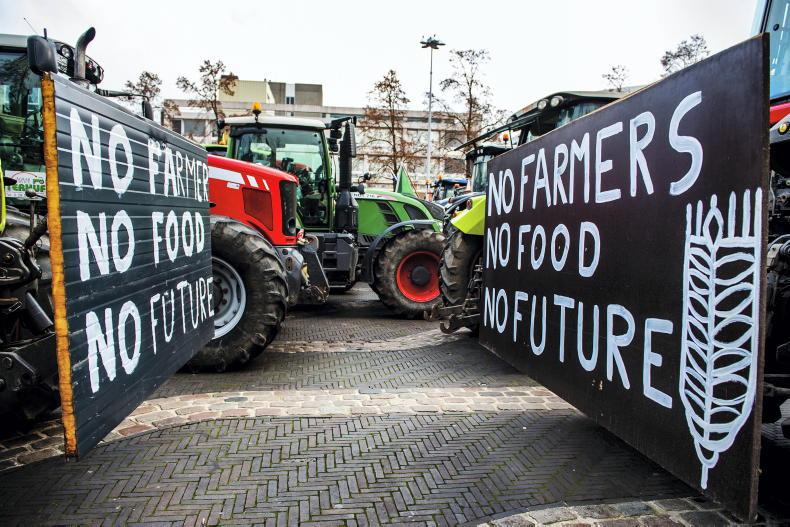

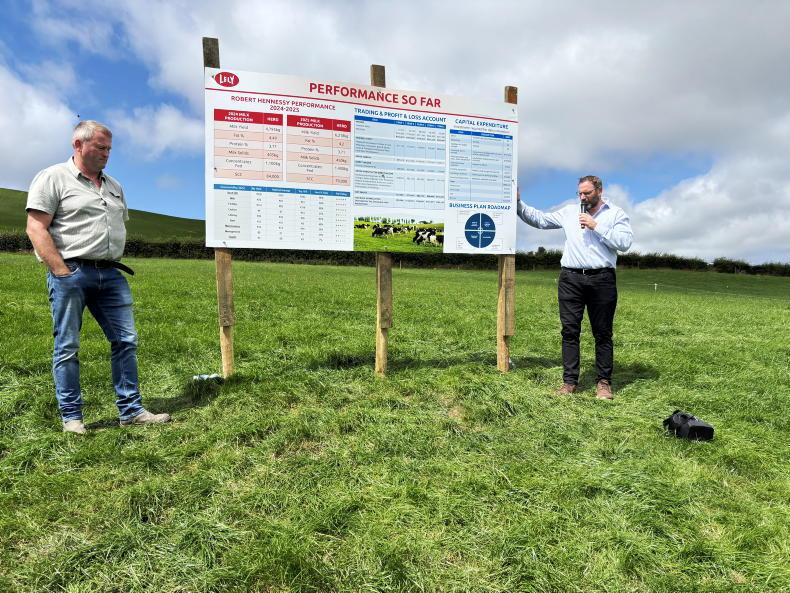
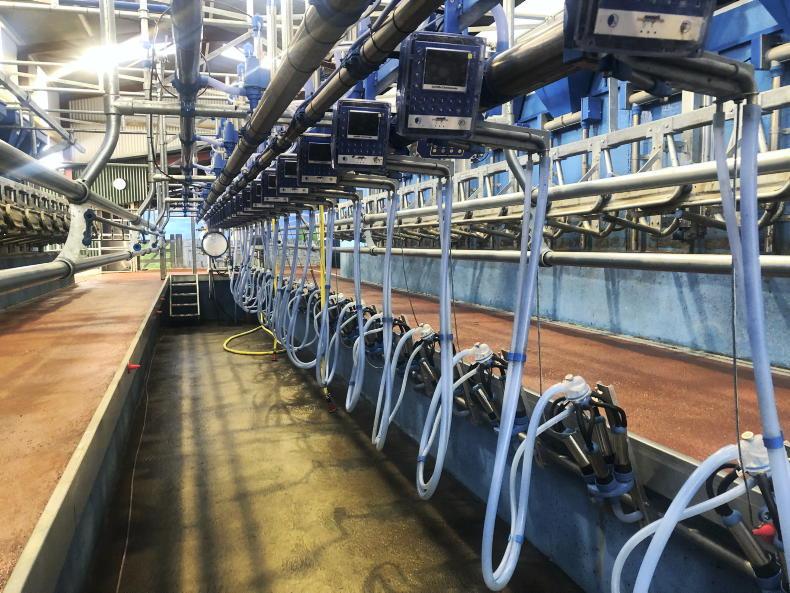
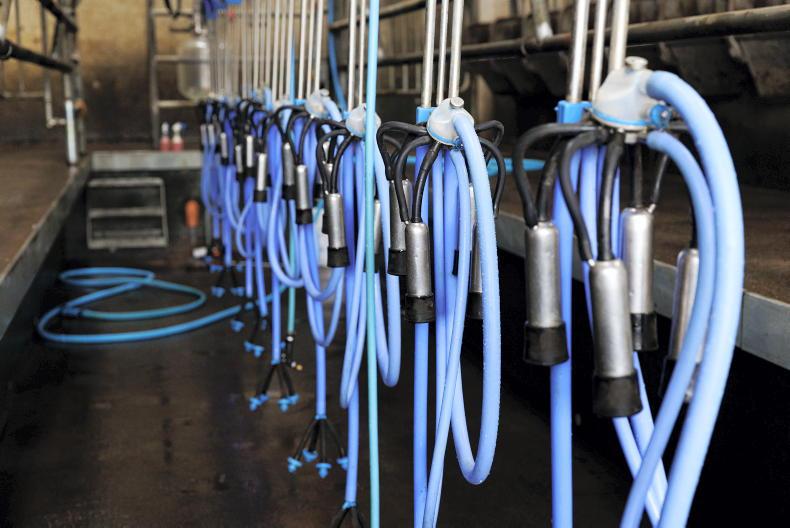
SHARING OPTIONS